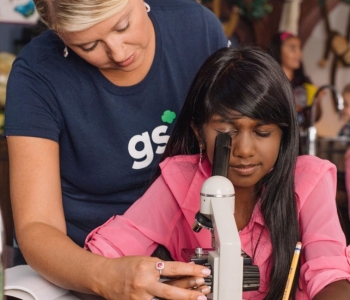Where to Find Local Experts for Your Girl Scout Activities

Community partners and local experts can inspire your Girl Scout troop to try new things—but that’s not the only reason you’ll want to team up with them! If you’ve got more questions than answers about a Cybersecurity badge or if shopping for camping gear feels overwhelming, you can lean on local partners to help you navigate new territory and boost your confidence in the process.
Get inspired by how our Volunteer Experts found the expert help they needed—then get creative and see where you might tap into local expertise for your troop!
Check with your council or service unit. “Our council publishes an online Community Collaborators booklet filled with local business contacts who will provide classes for troops," says Cheryl Lentsch, a troop leader at Girl Scouts Spirit of Nebraska.
“Our council’s community liaison set up an opportunity for Girl Scouts in our city to sell cookies at a networking event,” says Nancy Fink, a troop leader with Girl Scouts of Greater Chicago and Northwest Indiana. “We showed up with a list of [where] we needed expert help and asked for very specific skill sets. We also practiced an elevator speech [so we could] quickly tell this group what Girl Scouting does for girls. Thank goodness we came prepared, because the session ended with a quick ‘round-the-room opportunity to introduce yourself and explain what you do in one sentence!”
Need more ideas? Ask around at your next service unit meeting! Your service unit volunteers likely have some local recommendations or know of fellow troop leaders who’ve arranged similar guest speakers, events, or badge workshops.
Look within your troop community. You might be surprised by just how much talent you already have in your group! With enough notice and some guidance on how to best work with the girls, troop families are usually happy to share their skills.
“Our Cadettes wanted to earn the Woodworker badge,” remembers Cheryl. “One girl’s father works in the construction field, so I asked him if he would be willing to teach the girls how to saw wood, hammer nails, drill holes, and insert screws, as well as woodworking safety. He was happy to help and did a great job teaching them woodworking skills.”
“In addition to special skills and talents, our parents speak several languages, practice different religions, and have various cultural traditions that we’ve used to accomplish badges,” says Nancy. “We leveraged those differences to host a My Promise My Faith event for the Girl Scouts in our school. The program became an annual tradition and we’ve opened it to all the troops in our service unit.”
Reach out to first-degree connections. Think about who you interact with in your daily life: your girl’s school, your colleagues, fellow volunteers at other service organizations... What special skills might they be willing to lend to your troop?
“Our troop was partway through the Agent of Change Journey, and I discovered that a mom at my daughter’s school has extensive background as a respected community organizer and is the executive director of a local organization doing great work in our community,” says Denise Montgomery, a troop leader at Girl Scouts of San Diego. “So I asked this parent if our troop could come meet with her at her office and if she would share both her community organizing experience and her leadership journey.”
Adds Nancy, “I’m a retired U.S. Navy officer, so my troop tapped into military resources quite frequently. Although we have a large base nearby, people might be surprised at how many communities have access to National Guard or Reserve units. Most of them work on weekends, so that opens them up for event help as well as meeting assistance. Even more important to meeting Girl Scout goals, a large percentage of military personnel are young and many of the women service members are in professions normally dominated by men. We have used hospital corpsmen, military dog handlers, air traffic controllers, engineers, chaplains, and even boatswains' mates to teach us knots—and they were all women.”
Talk to local businesses and nonprofits. You're all invested in making your hometown a better place, so don’t be afraid to reach out and see how you might team up. Bonus: you might be surprised by how many local businesses are willing to offer your troop free or discounted programs!
"We attended a money management workshop at a local bank to earn a Financial Literacy badge,” says Cheryl. “A local sporting goods store also offered free classes about selecting appropriate camping gear, and that was very helpful for us. Other community resources were free, including trips to the local volunteer fire department for first-aid training and safety lessons.”
Check your local event listings. “Turnkey” community events are an easy way to save planning time while engaging your troop. “When our botanic garden announced its Bug and Insect Festival, the event was a natural for earning the Bugs badge,” explains Denise. “This well-organized festival included opportunities to touch all sorts of insects and learn from experts. The girls had a great time and learned a lot!”
And once you find the right local expert(s) or community partner(s)? Your troop can build important community relationships with them.





